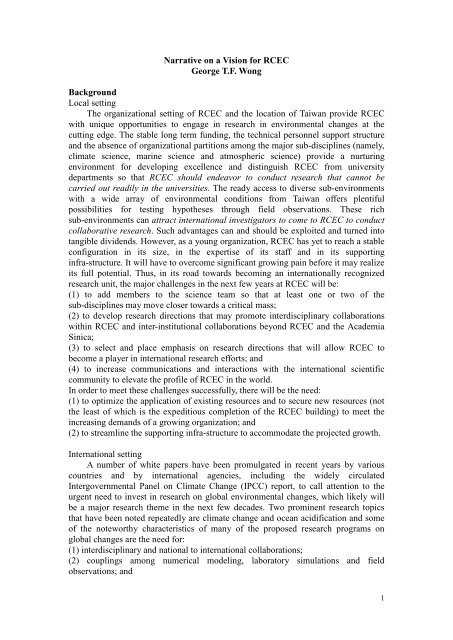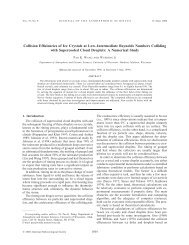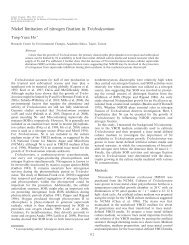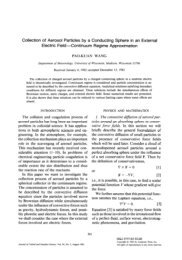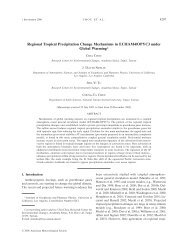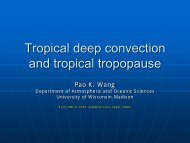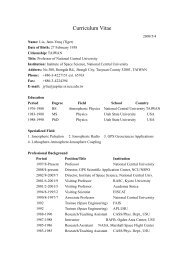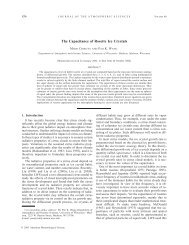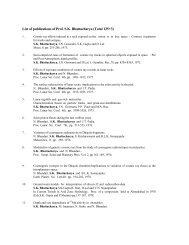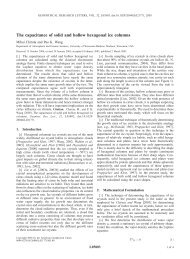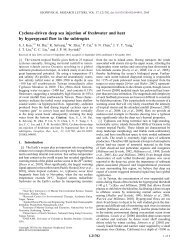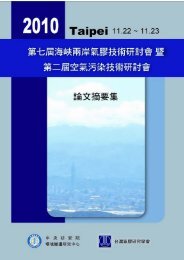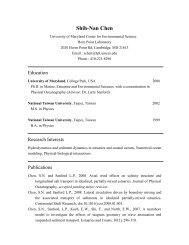RESUME GEORGE T. F. WONG - Academia Sinica
RESUME GEORGE T. F. WONG - Academia Sinica
RESUME GEORGE T. F. WONG - Academia Sinica
Create successful ePaper yourself
Turn your PDF publications into a flip-book with our unique Google optimized e-Paper software.
Narrative on a Vision for RCEC<br />
George T.F. Wong<br />
Background<br />
Local setting<br />
The organizational setting of RCEC and the location of Taiwan provide RCEC<br />
with unique opportunities to engage in research in environmental changes at the<br />
cutting edge. The stable long term funding, the technical personnel support structure<br />
and the absence of organizational partitions among the major sub-disciplines (namely,<br />
climate science, marine science and atmospheric science) provide a nurturing<br />
environment for developing excellence and distinguish RCEC from university<br />
departments so that RCEC should endeavor to conduct research that cannot be<br />
carried out readily in the universities. The ready access to diverse sub-environments<br />
with a wide array of environmental conditions from Taiwan offers plentiful<br />
possibilities for testing hypotheses through field observations. These rich<br />
sub-environments can attract international investigators to come to RCEC to conduct<br />
collaborative research. Such advantages can and should be exploited and turned into<br />
tangible dividends. However, as a young organization, RCEC has yet to reach a stable<br />
configuration in its size, in the expertise of its staff and in its supporting<br />
infra-structure. It will have to overcome significant growing pain before it may realize<br />
its full potential. Thus, in its road towards becoming an internationally recognized<br />
research unit, the major challenges in the next few years at RCEC will be:<br />
(1) to add members to the science team so that at least one or two of the<br />
sub-disciplines may move closer towards a critical mass;<br />
(2) to develop research directions that may promote interdisciplinary collaborations<br />
within RCEC and inter-institutional collaborations beyond RCEC and the <strong>Academia</strong><br />
<strong>Sinica</strong>;<br />
(3) to select and place emphasis on research directions that will allow RCEC to<br />
become a player in international research efforts; and<br />
(4) to increase communications and interactions with the international scientific<br />
community to elevate the profile of RCEC in the world.<br />
In order to meet these challenges successfully, there will be the need:<br />
(1) to optimize the application of existing resources and to secure new resources (not<br />
the least of which is the expeditious completion of the RCEC building) to meet the<br />
increasing demands of a growing organization; and<br />
(2) to streamline the supporting infra-structure to accommodate the projected growth.<br />
International setting<br />
A number of white papers have been promulgated in recent years by various<br />
countries and by international agencies, including the widely circulated<br />
Intergovernmental Panel on Climate Change (IPCC) report, to call attention to the<br />
urgent need to invest in research on global environmental changes, which likely will<br />
be a major research theme in the next few decades. Two prominent research topics<br />
that have been noted repeatedly are climate change and ocean acidification and some<br />
of the noteworthy characteristics of many of the proposed research programs on<br />
global changes are the need for:<br />
(1) interdisciplinary and national to international collaborations;<br />
(2) couplings among numerical modeling, laboratory simulations and field<br />
observations; and<br />
1


